Social and Stakeholder Analysis: Globalisation Report
VerifiedAdded on 2020/02/14
|12
|3484
|327
Report
AI Summary
This report delves into the multifaceted impact of globalization on international business, examining both the positive and negative social arguments surrounding its implementation. It begins by outlining the historical context of globalization, tracing its evolution from the late 20th century and highlighting its dimensions across political, economic, and cultural spheres. The report then presents a detailed analysis of the social arguments against globalization, identifying key issues such as environmental pollution and the exploitation of labor, while also recognizing its role in facilitating international trade and technological advancements. Furthermore, the report explores the stakeholder model, emphasizing the importance of considering the expectations and demands of various stakeholders, including internal and external groups, for effective corporate decision-making. It concludes by discussing the concept of sustainable business operations and how it relates to the stakeholder model, highlighting the importance of balancing economic growth with social and environmental considerations to achieve long-term business success.
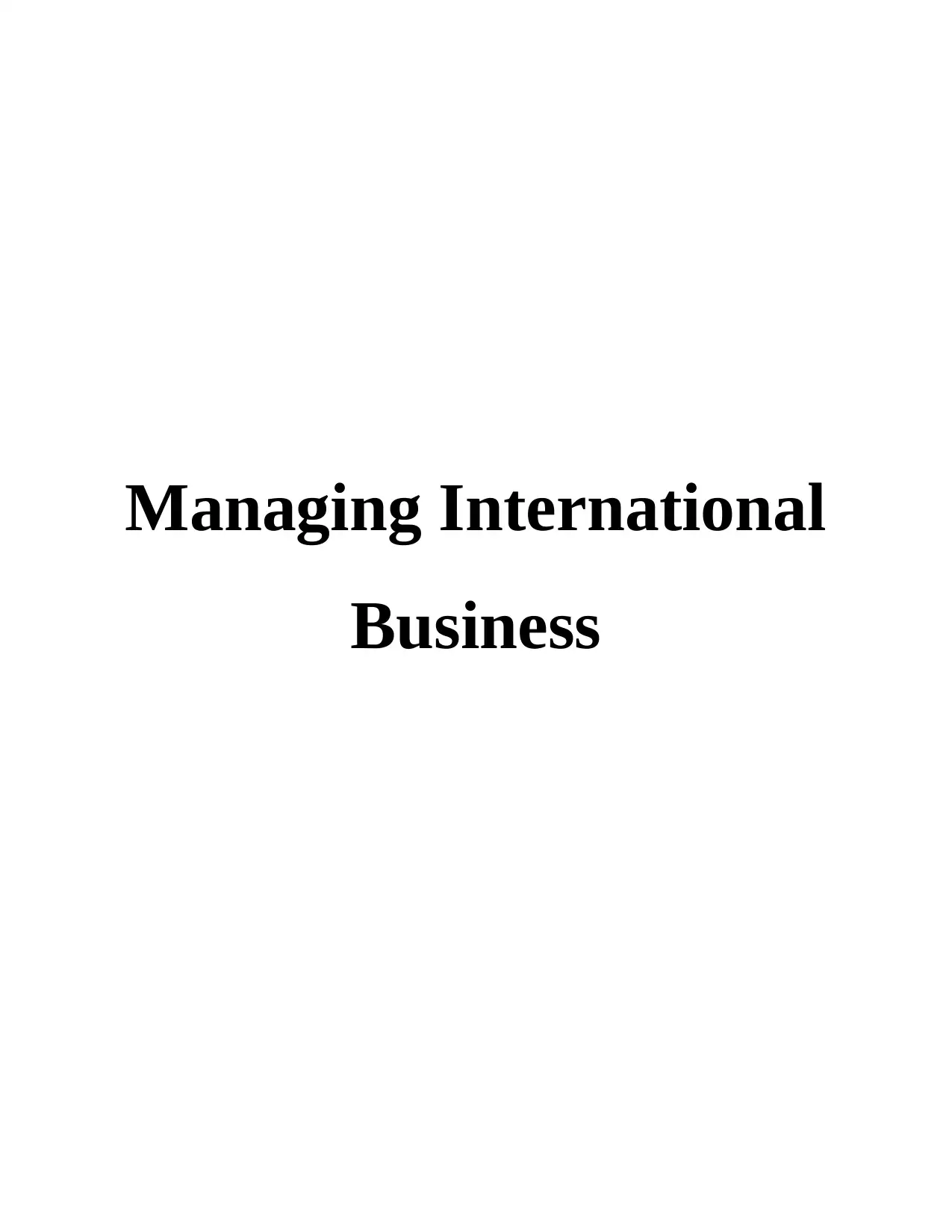
Managing International
Business
Business
Paraphrase This Document
Need a fresh take? Get an instant paraphrase of this document with our AI Paraphraser
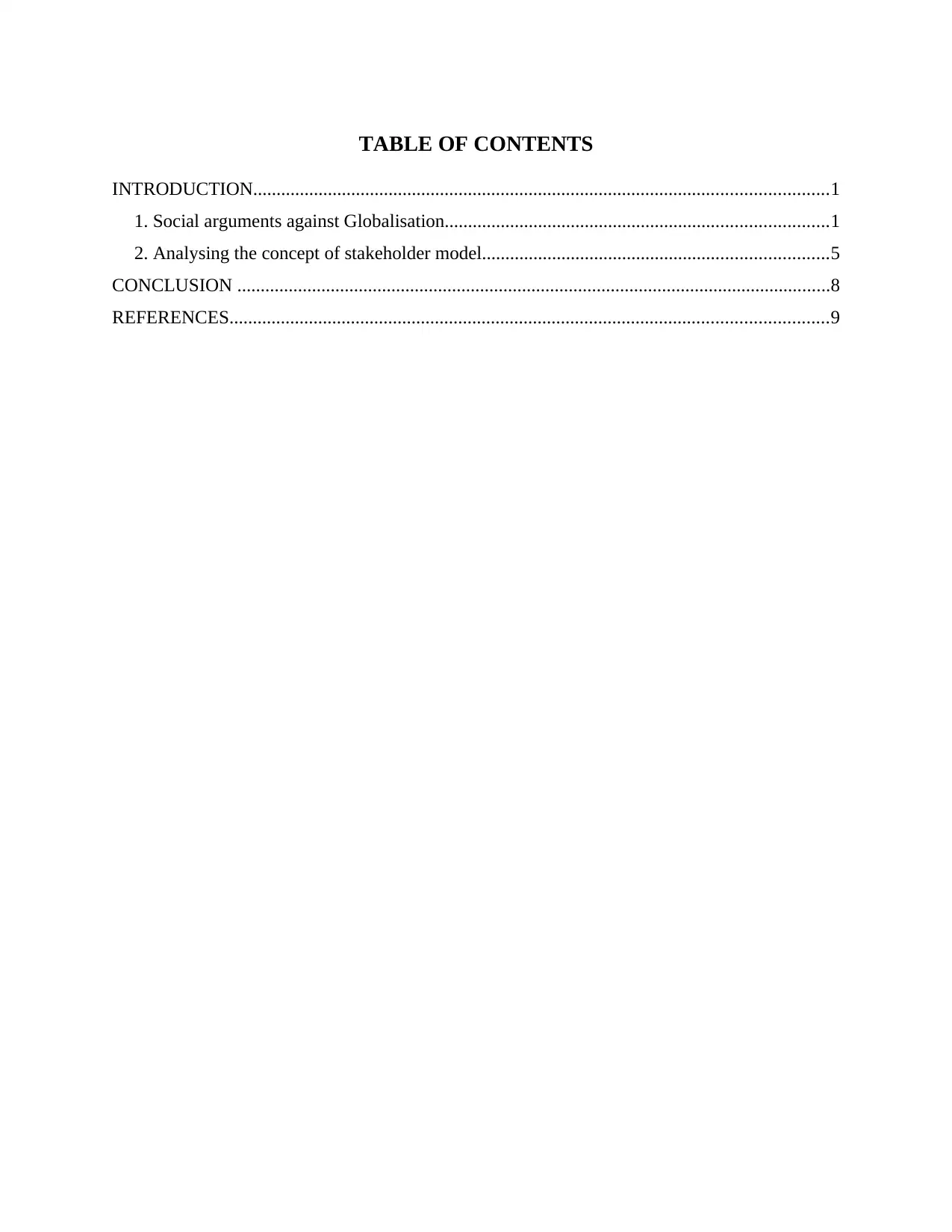
TABLE OF CONTENTS
INTRODUCTION...........................................................................................................................1
1. Social arguments against Globalisation..................................................................................1
2. Analysing the concept of stakeholder model..........................................................................5
CONCLUSION ...............................................................................................................................8
REFERENCES................................................................................................................................9
INTRODUCTION...........................................................................................................................1
1. Social arguments against Globalisation..................................................................................1
2. Analysing the concept of stakeholder model..........................................................................5
CONCLUSION ...............................................................................................................................8
REFERENCES................................................................................................................................9
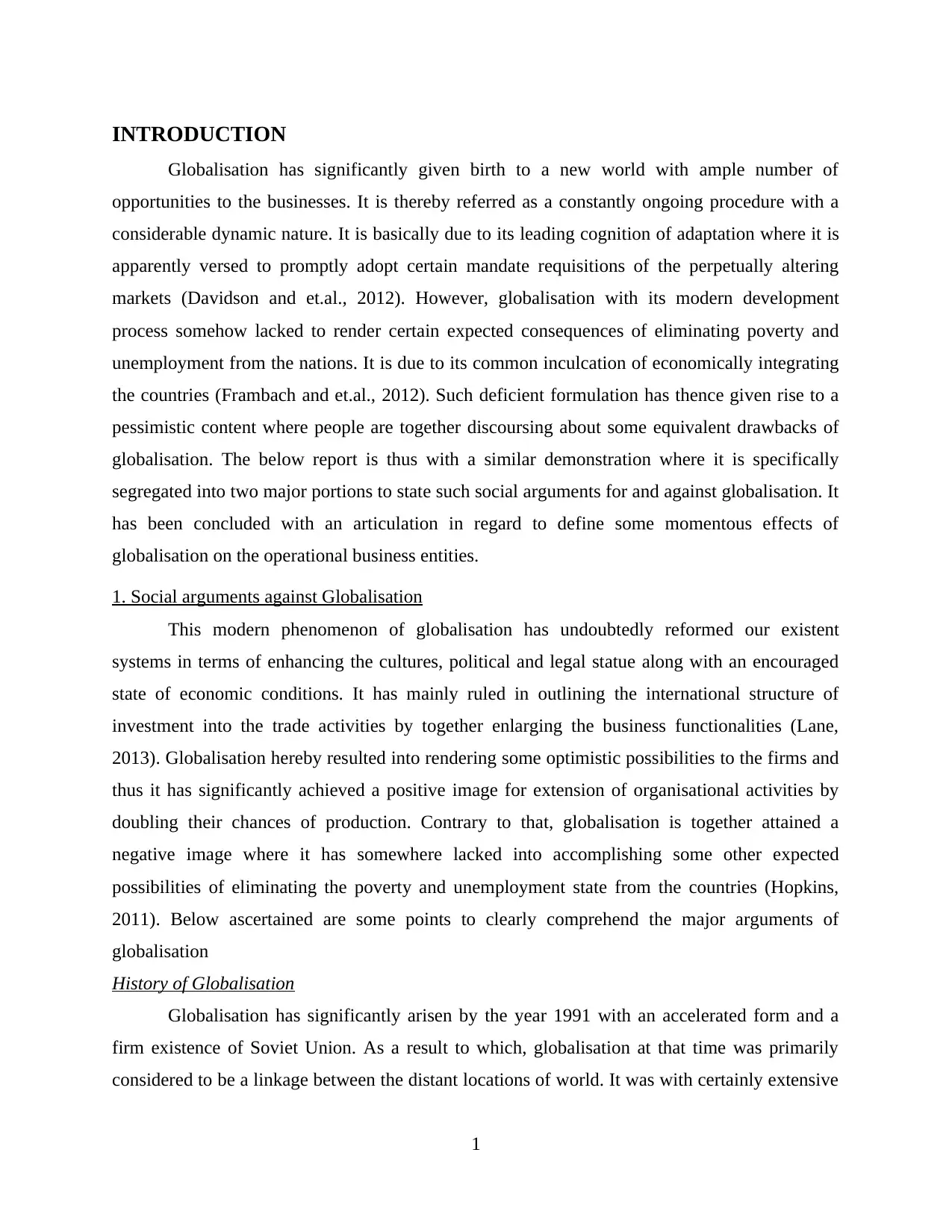
INTRODUCTION
Globalisation has significantly given birth to a new world with ample number of
opportunities to the businesses. It is thereby referred as a constantly ongoing procedure with a
considerable dynamic nature. It is basically due to its leading cognition of adaptation where it is
apparently versed to promptly adopt certain mandate requisitions of the perpetually altering
markets (Davidson and et.al., 2012). However, globalisation with its modern development
process somehow lacked to render certain expected consequences of eliminating poverty and
unemployment from the nations. It is due to its common inculcation of economically integrating
the countries (Frambach and et.al., 2012). Such deficient formulation has thence given rise to a
pessimistic content where people are together discoursing about some equivalent drawbacks of
globalisation. The below report is thus with a similar demonstration where it is specifically
segregated into two major portions to state such social arguments for and against globalisation. It
has been concluded with an articulation in regard to define some momentous effects of
globalisation on the operational business entities.
1. Social arguments against Globalisation
This modern phenomenon of globalisation has undoubtedly reformed our existent
systems in terms of enhancing the cultures, political and legal statue along with an encouraged
state of economic conditions. It has mainly ruled in outlining the international structure of
investment into the trade activities by together enlarging the business functionalities (Lane,
2013). Globalisation hereby resulted into rendering some optimistic possibilities to the firms and
thus it has significantly achieved a positive image for extension of organisational activities by
doubling their chances of production. Contrary to that, globalisation is together attained a
negative image where it has somewhere lacked into accomplishing some other expected
possibilities of eliminating the poverty and unemployment state from the countries (Hopkins,
2011). Below ascertained are some points to clearly comprehend the major arguments of
globalisation
History of Globalisation
Globalisation has significantly arisen by the year 1991 with an accelerated form and a
firm existence of Soviet Union. As a result to which, globalisation at that time was primarily
considered to be a linkage between the distant locations of world. It was with certainly extensive
1
Globalisation has significantly given birth to a new world with ample number of
opportunities to the businesses. It is thereby referred as a constantly ongoing procedure with a
considerable dynamic nature. It is basically due to its leading cognition of adaptation where it is
apparently versed to promptly adopt certain mandate requisitions of the perpetually altering
markets (Davidson and et.al., 2012). However, globalisation with its modern development
process somehow lacked to render certain expected consequences of eliminating poverty and
unemployment from the nations. It is due to its common inculcation of economically integrating
the countries (Frambach and et.al., 2012). Such deficient formulation has thence given rise to a
pessimistic content where people are together discoursing about some equivalent drawbacks of
globalisation. The below report is thus with a similar demonstration where it is specifically
segregated into two major portions to state such social arguments for and against globalisation. It
has been concluded with an articulation in regard to define some momentous effects of
globalisation on the operational business entities.
1. Social arguments against Globalisation
This modern phenomenon of globalisation has undoubtedly reformed our existent
systems in terms of enhancing the cultures, political and legal statue along with an encouraged
state of economic conditions. It has mainly ruled in outlining the international structure of
investment into the trade activities by together enlarging the business functionalities (Lane,
2013). Globalisation hereby resulted into rendering some optimistic possibilities to the firms and
thus it has significantly achieved a positive image for extension of organisational activities by
doubling their chances of production. Contrary to that, globalisation is together attained a
negative image where it has somewhere lacked into accomplishing some other expected
possibilities of eliminating the poverty and unemployment state from the countries (Hopkins,
2011). Below ascertained are some points to clearly comprehend the major arguments of
globalisation
History of Globalisation
Globalisation has significantly arisen by the year 1991 with an accelerated form and a
firm existence of Soviet Union. As a result to which, globalisation at that time was primarily
considered to be a linkage between the distant locations of world. It was with certainly extensive
1
⊘ This is a preview!⊘
Do you want full access?
Subscribe today to unlock all pages.

Trusted by 1+ million students worldwide
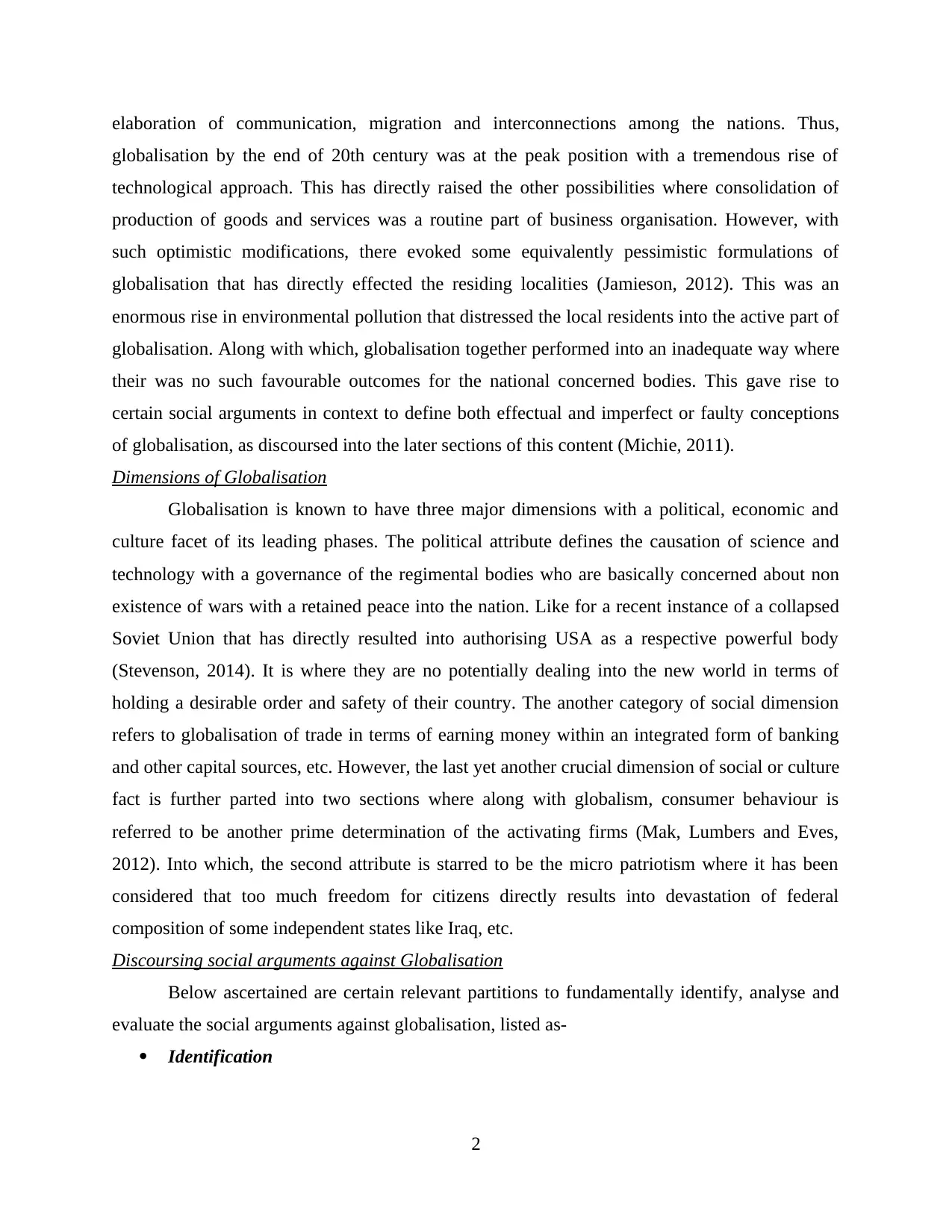
elaboration of communication, migration and interconnections among the nations. Thus,
globalisation by the end of 20th century was at the peak position with a tremendous rise of
technological approach. This has directly raised the other possibilities where consolidation of
production of goods and services was a routine part of business organisation. However, with
such optimistic modifications, there evoked some equivalently pessimistic formulations of
globalisation that has directly effected the residing localities (Jamieson, 2012). This was an
enormous rise in environmental pollution that distressed the local residents into the active part of
globalisation. Along with which, globalisation together performed into an inadequate way where
their was no such favourable outcomes for the national concerned bodies. This gave rise to
certain social arguments in context to define both effectual and imperfect or faulty conceptions
of globalisation, as discoursed into the later sections of this content (Michie, 2011).
Dimensions of Globalisation
Globalisation is known to have three major dimensions with a political, economic and
culture facet of its leading phases. The political attribute defines the causation of science and
technology with a governance of the regimental bodies who are basically concerned about non
existence of wars with a retained peace into the nation. Like for a recent instance of a collapsed
Soviet Union that has directly resulted into authorising USA as a respective powerful body
(Stevenson, 2014). It is where they are no potentially dealing into the new world in terms of
holding a desirable order and safety of their country. The another category of social dimension
refers to globalisation of trade in terms of earning money within an integrated form of banking
and other capital sources, etc. However, the last yet another crucial dimension of social or culture
fact is further parted into two sections where along with globalism, consumer behaviour is
referred to be another prime determination of the activating firms (Mak, Lumbers and Eves,
2012). Into which, the second attribute is starred to be the micro patriotism where it has been
considered that too much freedom for citizens directly results into devastation of federal
composition of some independent states like Iraq, etc.
Discoursing social arguments against Globalisation
Below ascertained are certain relevant partitions to fundamentally identify, analyse and
evaluate the social arguments against globalisation, listed as-
Identification
2
globalisation by the end of 20th century was at the peak position with a tremendous rise of
technological approach. This has directly raised the other possibilities where consolidation of
production of goods and services was a routine part of business organisation. However, with
such optimistic modifications, there evoked some equivalently pessimistic formulations of
globalisation that has directly effected the residing localities (Jamieson, 2012). This was an
enormous rise in environmental pollution that distressed the local residents into the active part of
globalisation. Along with which, globalisation together performed into an inadequate way where
their was no such favourable outcomes for the national concerned bodies. This gave rise to
certain social arguments in context to define both effectual and imperfect or faulty conceptions
of globalisation, as discoursed into the later sections of this content (Michie, 2011).
Dimensions of Globalisation
Globalisation is known to have three major dimensions with a political, economic and
culture facet of its leading phases. The political attribute defines the causation of science and
technology with a governance of the regimental bodies who are basically concerned about non
existence of wars with a retained peace into the nation. Like for a recent instance of a collapsed
Soviet Union that has directly resulted into authorising USA as a respective powerful body
(Stevenson, 2014). It is where they are no potentially dealing into the new world in terms of
holding a desirable order and safety of their country. The another category of social dimension
refers to globalisation of trade in terms of earning money within an integrated form of banking
and other capital sources, etc. However, the last yet another crucial dimension of social or culture
fact is further parted into two sections where along with globalism, consumer behaviour is
referred to be another prime determination of the activating firms (Mak, Lumbers and Eves,
2012). Into which, the second attribute is starred to be the micro patriotism where it has been
considered that too much freedom for citizens directly results into devastation of federal
composition of some independent states like Iraq, etc.
Discoursing social arguments against Globalisation
Below ascertained are certain relevant partitions to fundamentally identify, analyse and
evaluate the social arguments against globalisation, listed as-
Identification
2
Paraphrase This Document
Need a fresh take? Get an instant paraphrase of this document with our AI Paraphraser
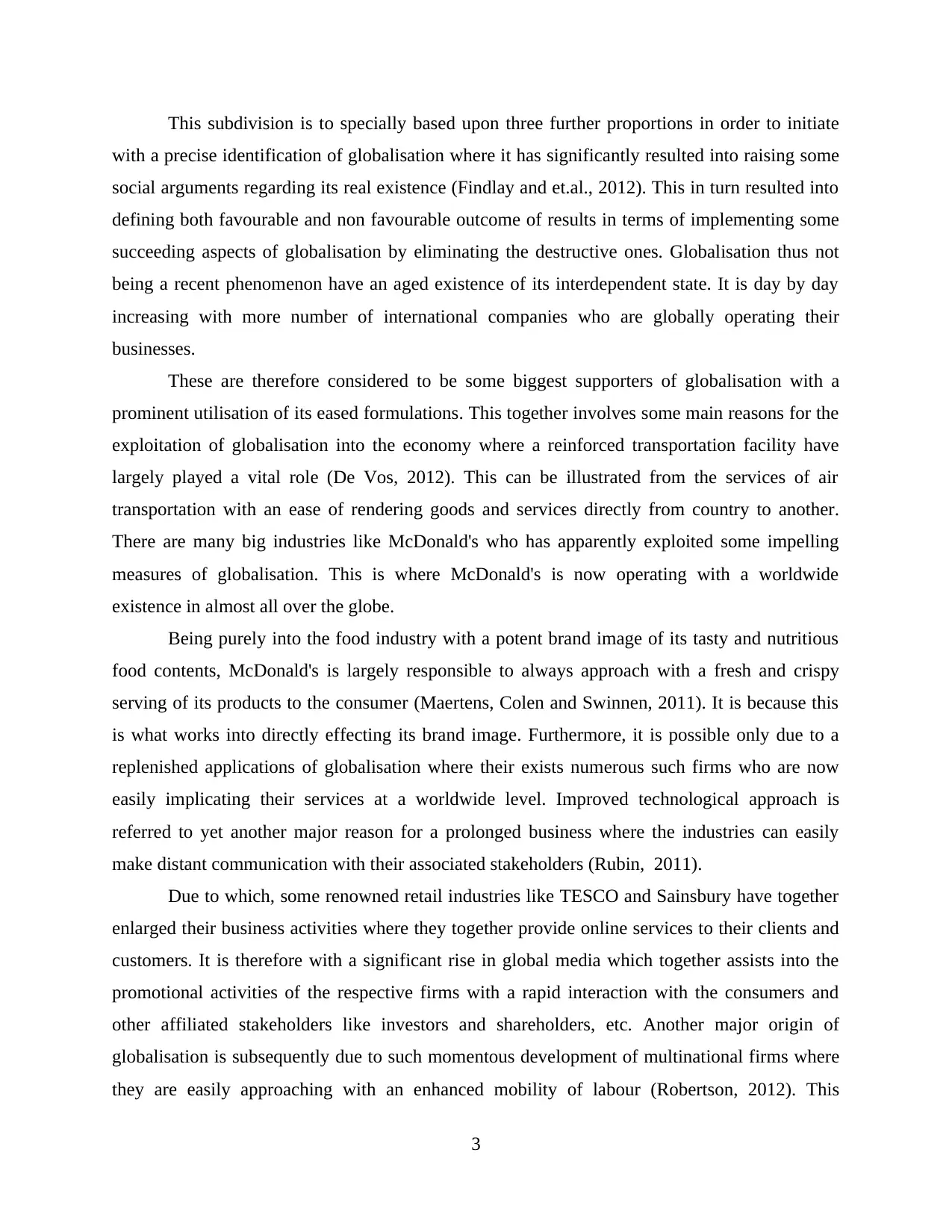
This subdivision is to specially based upon three further proportions in order to initiate
with a precise identification of globalisation where it has significantly resulted into raising some
social arguments regarding its real existence (Findlay and et.al., 2012). This in turn resulted into
defining both favourable and non favourable outcome of results in terms of implementing some
succeeding aspects of globalisation by eliminating the destructive ones. Globalisation thus not
being a recent phenomenon have an aged existence of its interdependent state. It is day by day
increasing with more number of international companies who are globally operating their
businesses.
These are therefore considered to be some biggest supporters of globalisation with a
prominent utilisation of its eased formulations. This together involves some main reasons for the
exploitation of globalisation into the economy where a reinforced transportation facility have
largely played a vital role (De Vos, 2012). This can be illustrated from the services of air
transportation with an ease of rendering goods and services directly from country to another.
There are many big industries like McDonald's who has apparently exploited some impelling
measures of globalisation. This is where McDonald's is now operating with a worldwide
existence in almost all over the globe.
Being purely into the food industry with a potent brand image of its tasty and nutritious
food contents, McDonald's is largely responsible to always approach with a fresh and crispy
serving of its products to the consumer (Maertens, Colen and Swinnen, 2011). It is because this
is what works into directly effecting its brand image. Furthermore, it is possible only due to a
replenished applications of globalisation where their exists numerous such firms who are now
easily implicating their services at a worldwide level. Improved technological approach is
referred to yet another major reason for a prolonged business where the industries can easily
make distant communication with their associated stakeholders (Rubin, 2011).
Due to which, some renowned retail industries like TESCO and Sainsbury have together
enlarged their business activities where they together provide online services to their clients and
customers. It is therefore with a significant rise in global media which together assists into the
promotional activities of the respective firms with a rapid interaction with the consumers and
other affiliated stakeholders like investors and shareholders, etc. Another major origin of
globalisation is subsequently due to such momentous development of multinational firms where
they are easily approaching with an enhanced mobility of labour (Robertson, 2012). This
3
with a precise identification of globalisation where it has significantly resulted into raising some
social arguments regarding its real existence (Findlay and et.al., 2012). This in turn resulted into
defining both favourable and non favourable outcome of results in terms of implementing some
succeeding aspects of globalisation by eliminating the destructive ones. Globalisation thus not
being a recent phenomenon have an aged existence of its interdependent state. It is day by day
increasing with more number of international companies who are globally operating their
businesses.
These are therefore considered to be some biggest supporters of globalisation with a
prominent utilisation of its eased formulations. This together involves some main reasons for the
exploitation of globalisation into the economy where a reinforced transportation facility have
largely played a vital role (De Vos, 2012). This can be illustrated from the services of air
transportation with an ease of rendering goods and services directly from country to another.
There are many big industries like McDonald's who has apparently exploited some impelling
measures of globalisation. This is where McDonald's is now operating with a worldwide
existence in almost all over the globe.
Being purely into the food industry with a potent brand image of its tasty and nutritious
food contents, McDonald's is largely responsible to always approach with a fresh and crispy
serving of its products to the consumer (Maertens, Colen and Swinnen, 2011). It is because this
is what works into directly effecting its brand image. Furthermore, it is possible only due to a
replenished applications of globalisation where their exists numerous such firms who are now
easily implicating their services at a worldwide level. Improved technological approach is
referred to yet another major reason for a prolonged business where the industries can easily
make distant communication with their associated stakeholders (Rubin, 2011).
Due to which, some renowned retail industries like TESCO and Sainsbury have together
enlarged their business activities where they together provide online services to their clients and
customers. It is therefore with a significant rise in global media which together assists into the
promotional activities of the respective firms with a rapid interaction with the consumers and
other affiliated stakeholders like investors and shareholders, etc. Another major origin of
globalisation is subsequently due to such momentous development of multinational firms where
they are easily approaching with an enhanced mobility of labour (Robertson, 2012). This
3
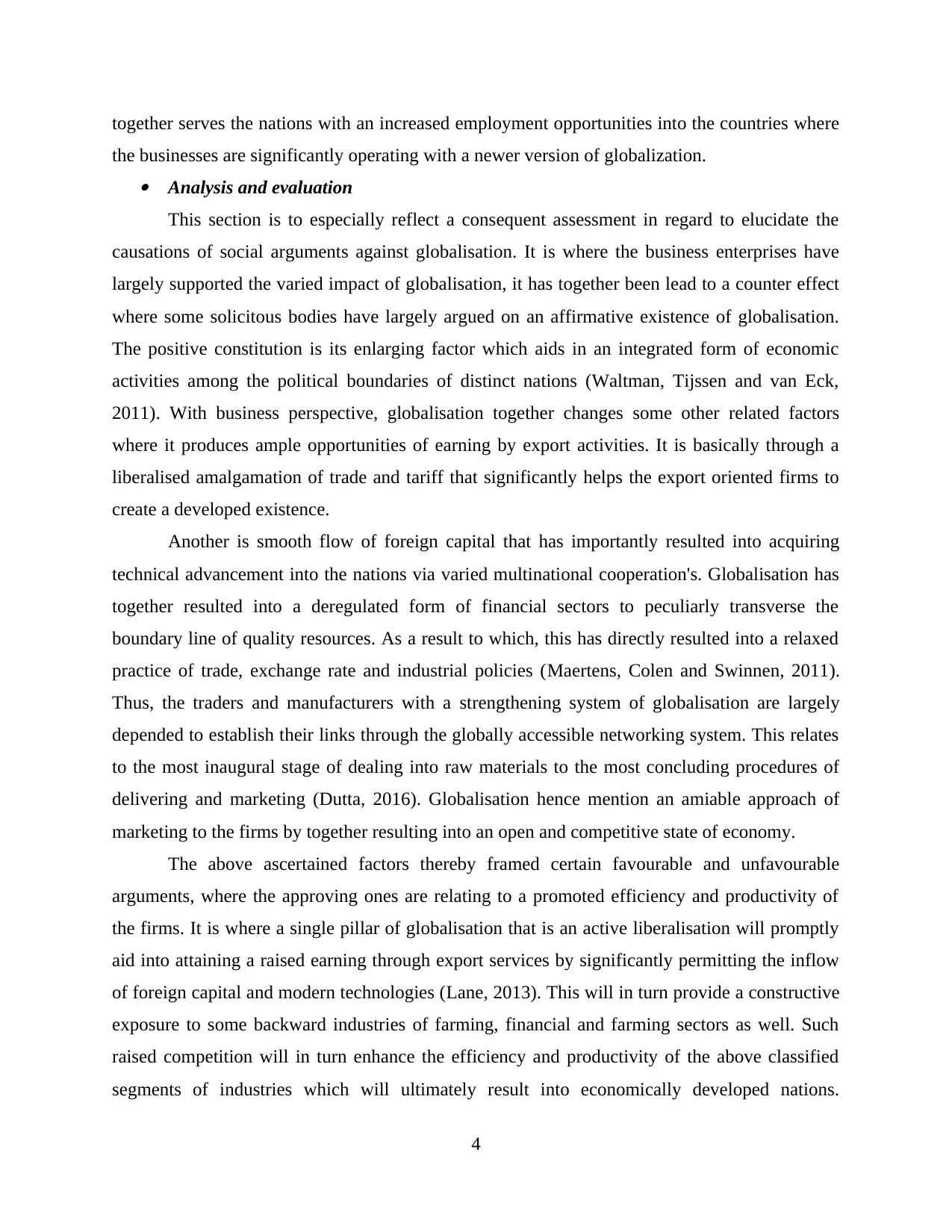
together serves the nations with an increased employment opportunities into the countries where
the businesses are significantly operating with a newer version of globalization. Analysis and evaluation
This section is to especially reflect a consequent assessment in regard to elucidate the
causations of social arguments against globalisation. It is where the business enterprises have
largely supported the varied impact of globalisation, it has together been lead to a counter effect
where some solicitous bodies have largely argued on an affirmative existence of globalisation.
The positive constitution is its enlarging factor which aids in an integrated form of economic
activities among the political boundaries of distinct nations (Waltman, Tijssen and van Eck,
2011). With business perspective, globalisation together changes some other related factors
where it produces ample opportunities of earning by export activities. It is basically through a
liberalised amalgamation of trade and tariff that significantly helps the export oriented firms to
create a developed existence.
Another is smooth flow of foreign capital that has importantly resulted into acquiring
technical advancement into the nations via varied multinational cooperation's. Globalisation has
together resulted into a deregulated form of financial sectors to peculiarly transverse the
boundary line of quality resources. As a result to which, this has directly resulted into a relaxed
practice of trade, exchange rate and industrial policies (Maertens, Colen and Swinnen, 2011).
Thus, the traders and manufacturers with a strengthening system of globalisation are largely
depended to establish their links through the globally accessible networking system. This relates
to the most inaugural stage of dealing into raw materials to the most concluding procedures of
delivering and marketing (Dutta, 2016). Globalisation hence mention an amiable approach of
marketing to the firms by together resulting into an open and competitive state of economy.
The above ascertained factors thereby framed certain favourable and unfavourable
arguments, where the approving ones are relating to a promoted efficiency and productivity of
the firms. It is where a single pillar of globalisation that is an active liberalisation will promptly
aid into attaining a raised earning through export services by significantly permitting the inflow
of foreign capital and modern technologies (Lane, 2013). This will in turn provide a constructive
exposure to some backward industries of farming, financial and farming sectors as well. Such
raised competition will in turn enhance the efficiency and productivity of the above classified
segments of industries which will ultimately result into economically developed nations.
4
the businesses are significantly operating with a newer version of globalization. Analysis and evaluation
This section is to especially reflect a consequent assessment in regard to elucidate the
causations of social arguments against globalisation. It is where the business enterprises have
largely supported the varied impact of globalisation, it has together been lead to a counter effect
where some solicitous bodies have largely argued on an affirmative existence of globalisation.
The positive constitution is its enlarging factor which aids in an integrated form of economic
activities among the political boundaries of distinct nations (Waltman, Tijssen and van Eck,
2011). With business perspective, globalisation together changes some other related factors
where it produces ample opportunities of earning by export activities. It is basically through a
liberalised amalgamation of trade and tariff that significantly helps the export oriented firms to
create a developed existence.
Another is smooth flow of foreign capital that has importantly resulted into acquiring
technical advancement into the nations via varied multinational cooperation's. Globalisation has
together resulted into a deregulated form of financial sectors to peculiarly transverse the
boundary line of quality resources. As a result to which, this has directly resulted into a relaxed
practice of trade, exchange rate and industrial policies (Maertens, Colen and Swinnen, 2011).
Thus, the traders and manufacturers with a strengthening system of globalisation are largely
depended to establish their links through the globally accessible networking system. This relates
to the most inaugural stage of dealing into raw materials to the most concluding procedures of
delivering and marketing (Dutta, 2016). Globalisation hence mention an amiable approach of
marketing to the firms by together resulting into an open and competitive state of economy.
The above ascertained factors thereby framed certain favourable and unfavourable
arguments, where the approving ones are relating to a promoted efficiency and productivity of
the firms. It is where a single pillar of globalisation that is an active liberalisation will promptly
aid into attaining a raised earning through export services by significantly permitting the inflow
of foreign capital and modern technologies (Lane, 2013). This will in turn provide a constructive
exposure to some backward industries of farming, financial and farming sectors as well. Such
raised competition will in turn enhance the efficiency and productivity of the above classified
segments of industries which will ultimately result into economically developed nations.
4
⊘ This is a preview!⊘
Do you want full access?
Subscribe today to unlock all pages.

Trusted by 1+ million students worldwide
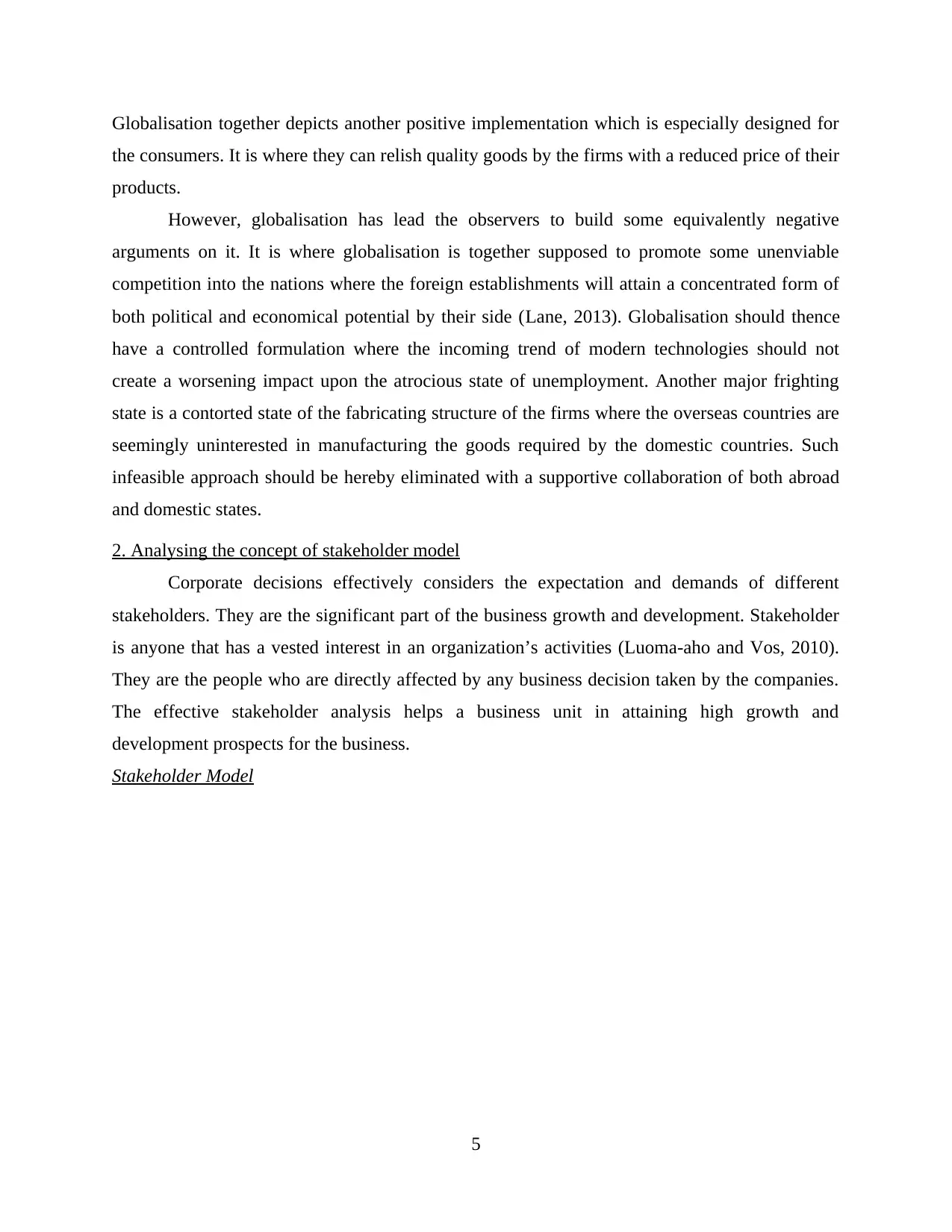
Globalisation together depicts another positive implementation which is especially designed for
the consumers. It is where they can relish quality goods by the firms with a reduced price of their
products.
However, globalisation has lead the observers to build some equivalently negative
arguments on it. It is where globalisation is together supposed to promote some unenviable
competition into the nations where the foreign establishments will attain a concentrated form of
both political and economical potential by their side (Lane, 2013). Globalisation should thence
have a controlled formulation where the incoming trend of modern technologies should not
create a worsening impact upon the atrocious state of unemployment. Another major frighting
state is a contorted state of the fabricating structure of the firms where the overseas countries are
seemingly uninterested in manufacturing the goods required by the domestic countries. Such
infeasible approach should be hereby eliminated with a supportive collaboration of both abroad
and domestic states.
2. Analysing the concept of stakeholder model
Corporate decisions effectively considers the expectation and demands of different
stakeholders. They are the significant part of the business growth and development. Stakeholder
is anyone that has a vested interest in an organization’s activities (Luoma-aho and Vos, 2010).
They are the people who are directly affected by any business decision taken by the companies.
The effective stakeholder analysis helps a business unit in attaining high growth and
development prospects for the business.
Stakeholder Model
5
the consumers. It is where they can relish quality goods by the firms with a reduced price of their
products.
However, globalisation has lead the observers to build some equivalently negative
arguments on it. It is where globalisation is together supposed to promote some unenviable
competition into the nations where the foreign establishments will attain a concentrated form of
both political and economical potential by their side (Lane, 2013). Globalisation should thence
have a controlled formulation where the incoming trend of modern technologies should not
create a worsening impact upon the atrocious state of unemployment. Another major frighting
state is a contorted state of the fabricating structure of the firms where the overseas countries are
seemingly uninterested in manufacturing the goods required by the domestic countries. Such
infeasible approach should be hereby eliminated with a supportive collaboration of both abroad
and domestic states.
2. Analysing the concept of stakeholder model
Corporate decisions effectively considers the expectation and demands of different
stakeholders. They are the significant part of the business growth and development. Stakeholder
is anyone that has a vested interest in an organization’s activities (Luoma-aho and Vos, 2010).
They are the people who are directly affected by any business decision taken by the companies.
The effective stakeholder analysis helps a business unit in attaining high growth and
development prospects for the business.
Stakeholder Model
5
Paraphrase This Document
Need a fresh take? Get an instant paraphrase of this document with our AI Paraphraser
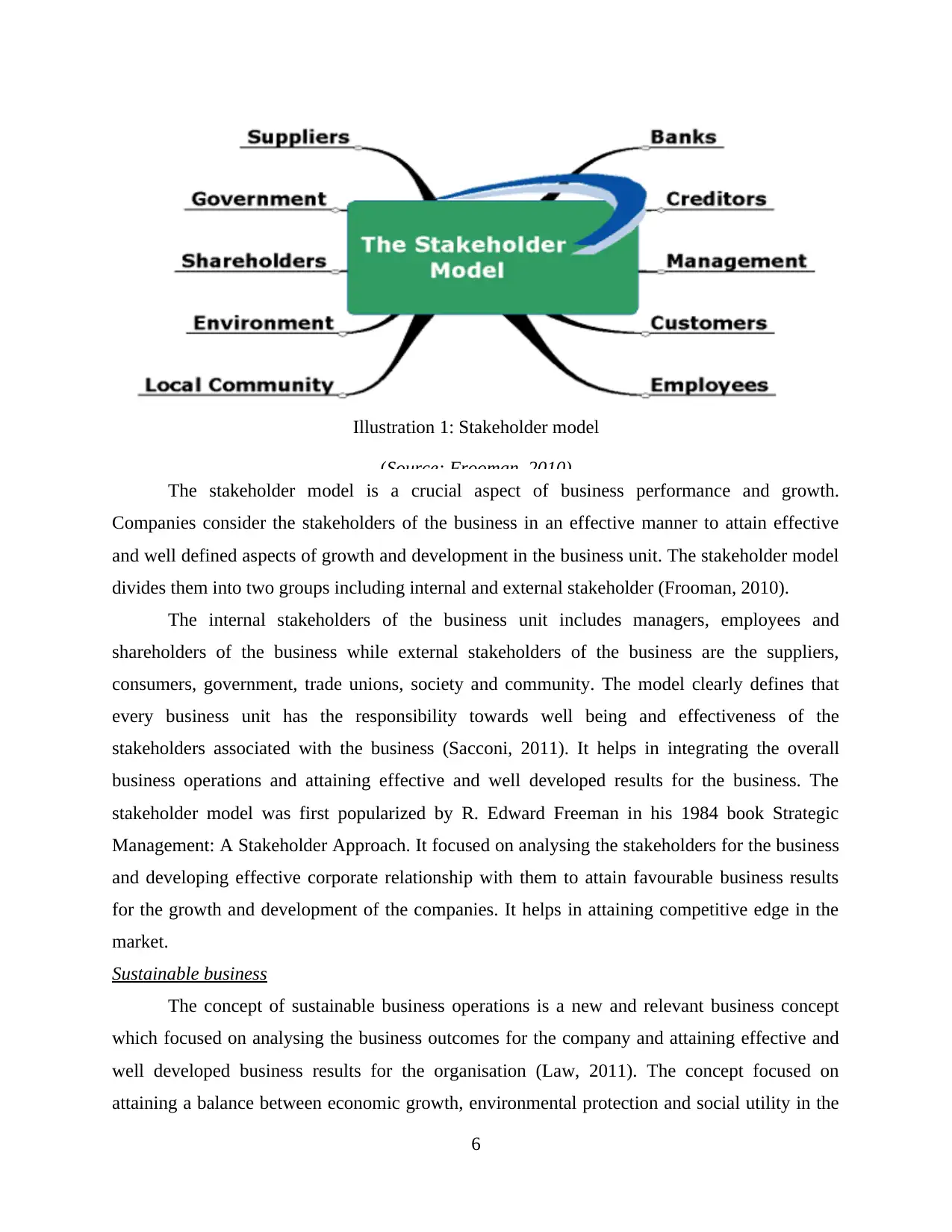
The stakeholder model is a crucial aspect of business performance and growth.
Companies consider the stakeholders of the business in an effective manner to attain effective
and well defined aspects of growth and development in the business unit. The stakeholder model
divides them into two groups including internal and external stakeholder (Frooman, 2010).
The internal stakeholders of the business unit includes managers, employees and
shareholders of the business while external stakeholders of the business are the suppliers,
consumers, government, trade unions, society and community. The model clearly defines that
every business unit has the responsibility towards well being and effectiveness of the
stakeholders associated with the business (Sacconi, 2011). It helps in integrating the overall
business operations and attaining effective and well developed results for the business. The
stakeholder model was first popularized by R. Edward Freeman in his 1984 book Strategic
Management: A Stakeholder Approach. It focused on analysing the stakeholders for the business
and developing effective corporate relationship with them to attain favourable business results
for the growth and development of the companies. It helps in attaining competitive edge in the
market.
Sustainable business
The concept of sustainable business operations is a new and relevant business concept
which focused on analysing the business outcomes for the company and attaining effective and
well developed business results for the organisation (Law, 2011). The concept focused on
attaining a balance between economic growth, environmental protection and social utility in the
6
Illustration 1: Stakeholder model
(Source: Frooman, 2010)
Companies consider the stakeholders of the business in an effective manner to attain effective
and well defined aspects of growth and development in the business unit. The stakeholder model
divides them into two groups including internal and external stakeholder (Frooman, 2010).
The internal stakeholders of the business unit includes managers, employees and
shareholders of the business while external stakeholders of the business are the suppliers,
consumers, government, trade unions, society and community. The model clearly defines that
every business unit has the responsibility towards well being and effectiveness of the
stakeholders associated with the business (Sacconi, 2011). It helps in integrating the overall
business operations and attaining effective and well developed results for the business. The
stakeholder model was first popularized by R. Edward Freeman in his 1984 book Strategic
Management: A Stakeholder Approach. It focused on analysing the stakeholders for the business
and developing effective corporate relationship with them to attain favourable business results
for the growth and development of the companies. It helps in attaining competitive edge in the
market.
Sustainable business
The concept of sustainable business operations is a new and relevant business concept
which focused on analysing the business outcomes for the company and attaining effective and
well developed business results for the organisation (Law, 2011). The concept focused on
attaining a balance between economic growth, environmental protection and social utility in the
6
Illustration 1: Stakeholder model
(Source: Frooman, 2010)
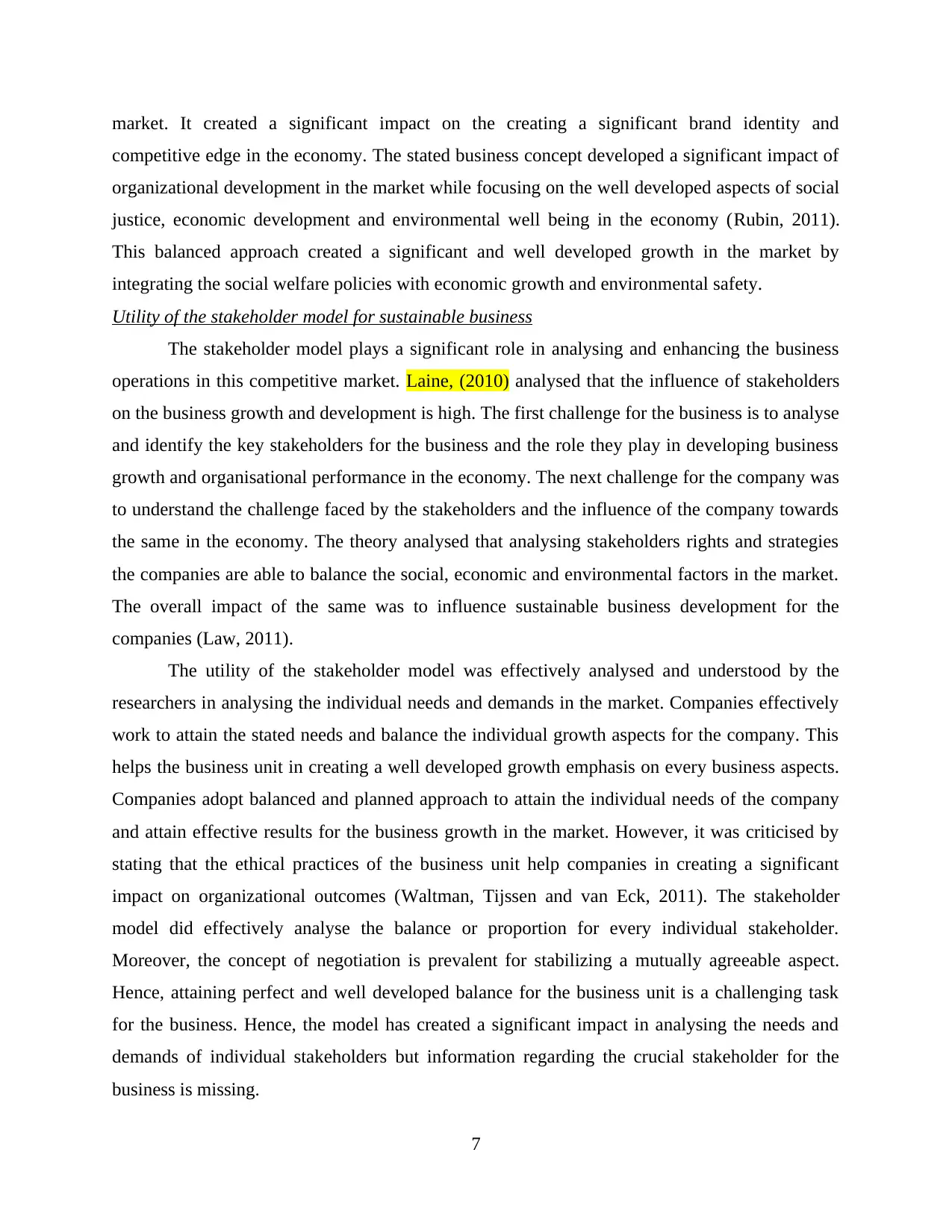
market. It created a significant impact on the creating a significant brand identity and
competitive edge in the economy. The stated business concept developed a significant impact of
organizational development in the market while focusing on the well developed aspects of social
justice, economic development and environmental well being in the economy (Rubin, 2011).
This balanced approach created a significant and well developed growth in the market by
integrating the social welfare policies with economic growth and environmental safety.
Utility of the stakeholder model for sustainable business
The stakeholder model plays a significant role in analysing and enhancing the business
operations in this competitive market. Laine, (2010) analysed that the influence of stakeholders
on the business growth and development is high. The first challenge for the business is to analyse
and identify the key stakeholders for the business and the role they play in developing business
growth and organisational performance in the economy. The next challenge for the company was
to understand the challenge faced by the stakeholders and the influence of the company towards
the same in the economy. The theory analysed that analysing stakeholders rights and strategies
the companies are able to balance the social, economic and environmental factors in the market.
The overall impact of the same was to influence sustainable business development for the
companies (Law, 2011).
The utility of the stakeholder model was effectively analysed and understood by the
researchers in analysing the individual needs and demands in the market. Companies effectively
work to attain the stated needs and balance the individual growth aspects for the company. This
helps the business unit in creating a well developed growth emphasis on every business aspects.
Companies adopt balanced and planned approach to attain the individual needs of the company
and attain effective results for the business growth in the market. However, it was criticised by
stating that the ethical practices of the business unit help companies in creating a significant
impact on organizational outcomes (Waltman, Tijssen and van Eck, 2011). The stakeholder
model did effectively analyse the balance or proportion for every individual stakeholder.
Moreover, the concept of negotiation is prevalent for stabilizing a mutually agreeable aspect.
Hence, attaining perfect and well developed balance for the business unit is a challenging task
for the business. Hence, the model has created a significant impact in analysing the needs and
demands of individual stakeholders but information regarding the crucial stakeholder for the
business is missing.
7
competitive edge in the economy. The stated business concept developed a significant impact of
organizational development in the market while focusing on the well developed aspects of social
justice, economic development and environmental well being in the economy (Rubin, 2011).
This balanced approach created a significant and well developed growth in the market by
integrating the social welfare policies with economic growth and environmental safety.
Utility of the stakeholder model for sustainable business
The stakeholder model plays a significant role in analysing and enhancing the business
operations in this competitive market. Laine, (2010) analysed that the influence of stakeholders
on the business growth and development is high. The first challenge for the business is to analyse
and identify the key stakeholders for the business and the role they play in developing business
growth and organisational performance in the economy. The next challenge for the company was
to understand the challenge faced by the stakeholders and the influence of the company towards
the same in the economy. The theory analysed that analysing stakeholders rights and strategies
the companies are able to balance the social, economic and environmental factors in the market.
The overall impact of the same was to influence sustainable business development for the
companies (Law, 2011).
The utility of the stakeholder model was effectively analysed and understood by the
researchers in analysing the individual needs and demands in the market. Companies effectively
work to attain the stated needs and balance the individual growth aspects for the company. This
helps the business unit in creating a well developed growth emphasis on every business aspects.
Companies adopt balanced and planned approach to attain the individual needs of the company
and attain effective results for the business growth in the market. However, it was criticised by
stating that the ethical practices of the business unit help companies in creating a significant
impact on organizational outcomes (Waltman, Tijssen and van Eck, 2011). The stakeholder
model did effectively analyse the balance or proportion for every individual stakeholder.
Moreover, the concept of negotiation is prevalent for stabilizing a mutually agreeable aspect.
Hence, attaining perfect and well developed balance for the business unit is a challenging task
for the business. Hence, the model has created a significant impact in analysing the needs and
demands of individual stakeholders but information regarding the crucial stakeholder for the
business is missing.
7
⊘ This is a preview!⊘
Do you want full access?
Subscribe today to unlock all pages.

Trusted by 1+ million students worldwide
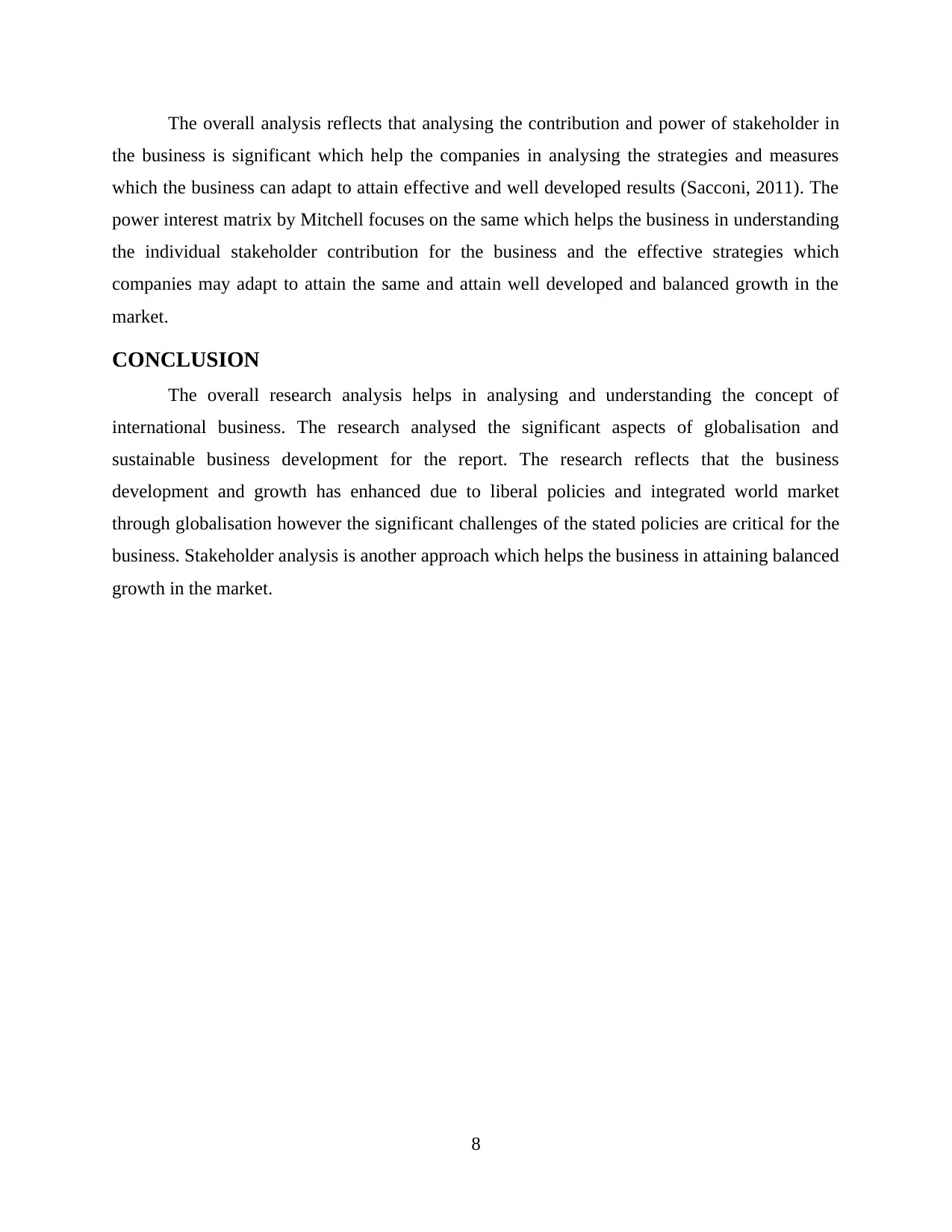
The overall analysis reflects that analysing the contribution and power of stakeholder in
the business is significant which help the companies in analysing the strategies and measures
which the business can adapt to attain effective and well developed results (Sacconi, 2011). The
power interest matrix by Mitchell focuses on the same which helps the business in understanding
the individual stakeholder contribution for the business and the effective strategies which
companies may adapt to attain the same and attain well developed and balanced growth in the
market.
CONCLUSION
The overall research analysis helps in analysing and understanding the concept of
international business. The research analysed the significant aspects of globalisation and
sustainable business development for the report. The research reflects that the business
development and growth has enhanced due to liberal policies and integrated world market
through globalisation however the significant challenges of the stated policies are critical for the
business. Stakeholder analysis is another approach which helps the business in attaining balanced
growth in the market.
8
the business is significant which help the companies in analysing the strategies and measures
which the business can adapt to attain effective and well developed results (Sacconi, 2011). The
power interest matrix by Mitchell focuses on the same which helps the business in understanding
the individual stakeholder contribution for the business and the effective strategies which
companies may adapt to attain the same and attain well developed and balanced growth in the
market.
CONCLUSION
The overall research analysis helps in analysing and understanding the concept of
international business. The research analysed the significant aspects of globalisation and
sustainable business development for the report. The research reflects that the business
development and growth has enhanced due to liberal policies and integrated world market
through globalisation however the significant challenges of the stated policies are critical for the
business. Stakeholder analysis is another approach which helps the business in attaining balanced
growth in the market.
8
Paraphrase This Document
Need a fresh take? Get an instant paraphrase of this document with our AI Paraphraser
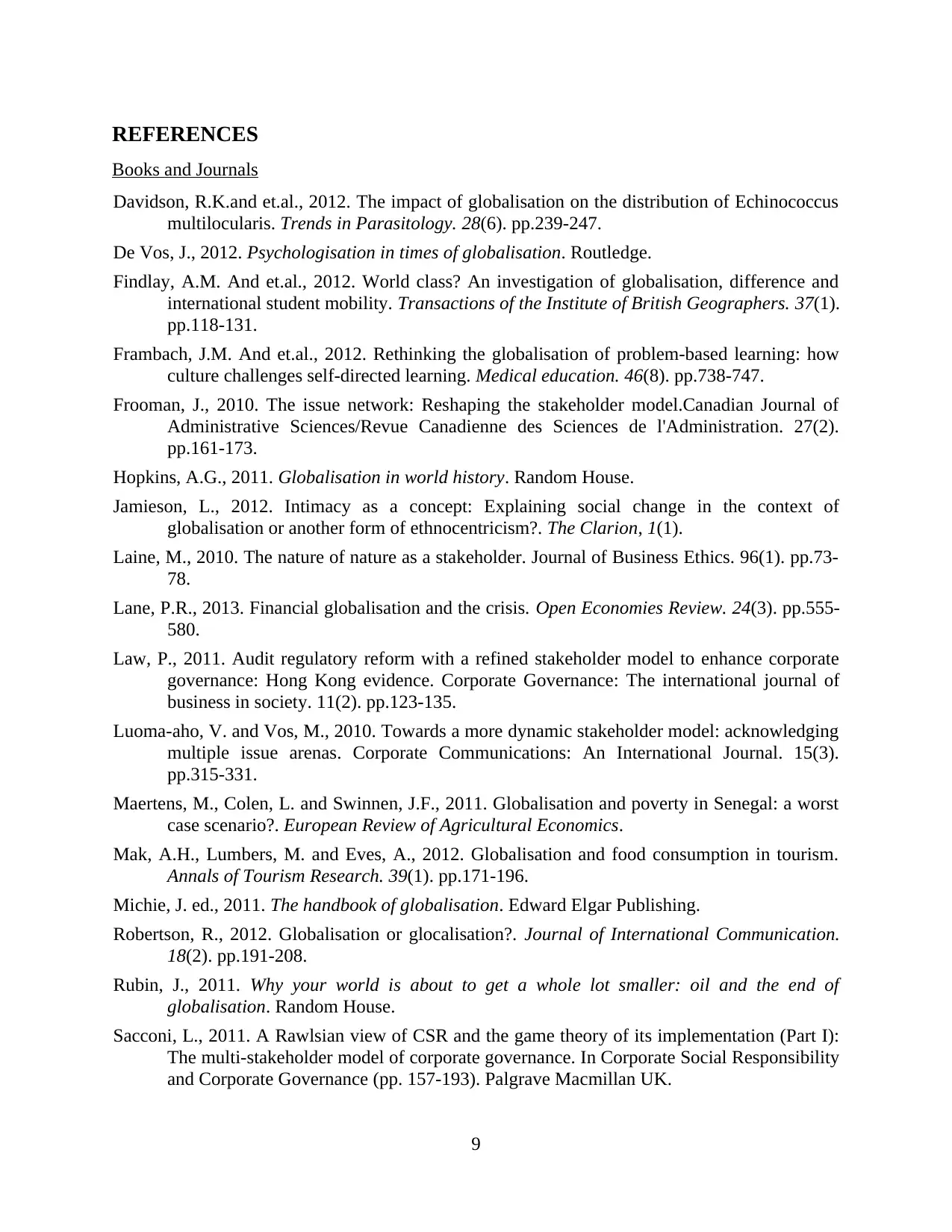
REFERENCES
Books and Journals
Davidson, R.K.and et.al., 2012. The impact of globalisation on the distribution of Echinococcus
multilocularis. Trends in Parasitology. 28(6). pp.239-247.
De Vos, J., 2012. Psychologisation in times of globalisation. Routledge.
Findlay, A.M. And et.al., 2012. World class? An investigation of globalisation, difference and
international student mobility. Transactions of the Institute of British Geographers. 37(1).
pp.118-131.
Frambach, J.M. And et.al., 2012. Rethinking the globalisation of problem‐based learning: how
culture challenges self‐directed learning. Medical education. 46(8). pp.738-747.
Frooman, J., 2010. The issue network: Reshaping the stakeholder model.Canadian Journal of
Administrative Sciences/Revue Canadienne des Sciences de l'Administration. 27(2).
pp.161-173.
Hopkins, A.G., 2011. Globalisation in world history. Random House.
Jamieson, L., 2012. Intimacy as a concept: Explaining social change in the context of
globalisation or another form of ethnocentricism?. The Clarion, 1(1).
Laine, M., 2010. The nature of nature as a stakeholder. Journal of Business Ethics. 96(1). pp.73-
78.
Lane, P.R., 2013. Financial globalisation and the crisis. Open Economies Review. 24(3). pp.555-
580.
Law, P., 2011. Audit regulatory reform with a refined stakeholder model to enhance corporate
governance: Hong Kong evidence. Corporate Governance: The international journal of
business in society. 11(2). pp.123-135.
Luoma-aho, V. and Vos, M., 2010. Towards a more dynamic stakeholder model: acknowledging
multiple issue arenas. Corporate Communications: An International Journal. 15(3).
pp.315-331.
Maertens, M., Colen, L. and Swinnen, J.F., 2011. Globalisation and poverty in Senegal: a worst
case scenario?. European Review of Agricultural Economics.
Mak, A.H., Lumbers, M. and Eves, A., 2012. Globalisation and food consumption in tourism.
Annals of Tourism Research. 39(1). pp.171-196.
Michie, J. ed., 2011. The handbook of globalisation. Edward Elgar Publishing.
Robertson, R., 2012. Globalisation or glocalisation?. Journal of International Communication.
18(2). pp.191-208.
Rubin, J., 2011. Why your world is about to get a whole lot smaller: oil and the end of
globalisation. Random House.
Sacconi, L., 2011. A Rawlsian view of CSR and the game theory of its implementation (Part I):
The multi-stakeholder model of corporate governance. In Corporate Social Responsibility
and Corporate Governance (pp. 157-193). Palgrave Macmillan UK.
9
Books and Journals
Davidson, R.K.and et.al., 2012. The impact of globalisation on the distribution of Echinococcus
multilocularis. Trends in Parasitology. 28(6). pp.239-247.
De Vos, J., 2012. Psychologisation in times of globalisation. Routledge.
Findlay, A.M. And et.al., 2012. World class? An investigation of globalisation, difference and
international student mobility. Transactions of the Institute of British Geographers. 37(1).
pp.118-131.
Frambach, J.M. And et.al., 2012. Rethinking the globalisation of problem‐based learning: how
culture challenges self‐directed learning. Medical education. 46(8). pp.738-747.
Frooman, J., 2010. The issue network: Reshaping the stakeholder model.Canadian Journal of
Administrative Sciences/Revue Canadienne des Sciences de l'Administration. 27(2).
pp.161-173.
Hopkins, A.G., 2011. Globalisation in world history. Random House.
Jamieson, L., 2012. Intimacy as a concept: Explaining social change in the context of
globalisation or another form of ethnocentricism?. The Clarion, 1(1).
Laine, M., 2010. The nature of nature as a stakeholder. Journal of Business Ethics. 96(1). pp.73-
78.
Lane, P.R., 2013. Financial globalisation and the crisis. Open Economies Review. 24(3). pp.555-
580.
Law, P., 2011. Audit regulatory reform with a refined stakeholder model to enhance corporate
governance: Hong Kong evidence. Corporate Governance: The international journal of
business in society. 11(2). pp.123-135.
Luoma-aho, V. and Vos, M., 2010. Towards a more dynamic stakeholder model: acknowledging
multiple issue arenas. Corporate Communications: An International Journal. 15(3).
pp.315-331.
Maertens, M., Colen, L. and Swinnen, J.F., 2011. Globalisation and poverty in Senegal: a worst
case scenario?. European Review of Agricultural Economics.
Mak, A.H., Lumbers, M. and Eves, A., 2012. Globalisation and food consumption in tourism.
Annals of Tourism Research. 39(1). pp.171-196.
Michie, J. ed., 2011. The handbook of globalisation. Edward Elgar Publishing.
Robertson, R., 2012. Globalisation or glocalisation?. Journal of International Communication.
18(2). pp.191-208.
Rubin, J., 2011. Why your world is about to get a whole lot smaller: oil and the end of
globalisation. Random House.
Sacconi, L., 2011. A Rawlsian view of CSR and the game theory of its implementation (Part I):
The multi-stakeholder model of corporate governance. In Corporate Social Responsibility
and Corporate Governance (pp. 157-193). Palgrave Macmillan UK.
9
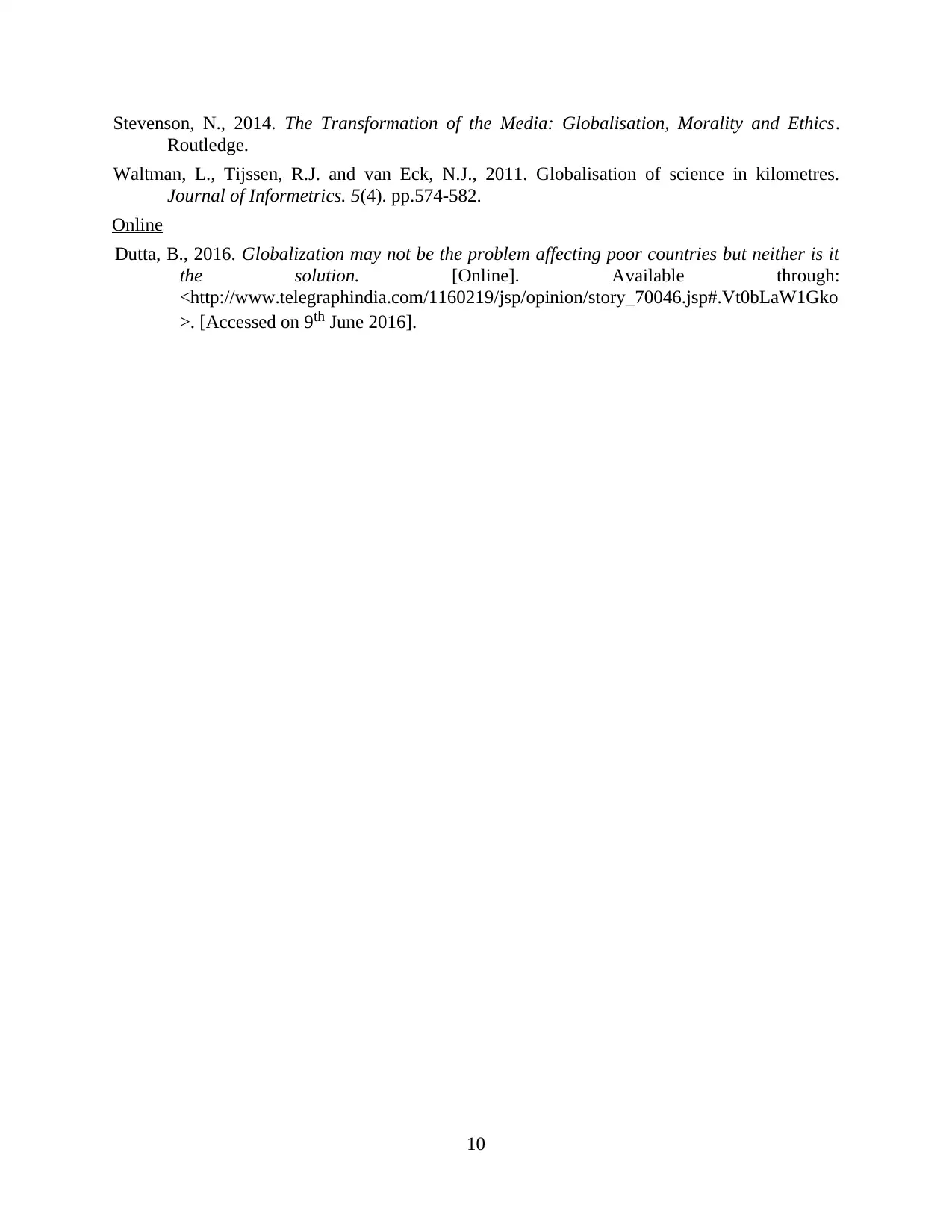
Stevenson, N., 2014. The Transformation of the Media: Globalisation, Morality and Ethics.
Routledge.
Waltman, L., Tijssen, R.J. and van Eck, N.J., 2011. Globalisation of science in kilometres.
Journal of Informetrics. 5(4). pp.574-582.
Online
Dutta, B., 2016. Globalization may not be the problem affecting poor countries but neither is it
the solution. [Online]. Available through:
<http://www.telegraphindia.com/1160219/jsp/opinion/story_70046.jsp#.Vt0bLaW1Gko
>. [Accessed on 9th June 2016].
10
Routledge.
Waltman, L., Tijssen, R.J. and van Eck, N.J., 2011. Globalisation of science in kilometres.
Journal of Informetrics. 5(4). pp.574-582.
Online
Dutta, B., 2016. Globalization may not be the problem affecting poor countries but neither is it
the solution. [Online]. Available through:
<http://www.telegraphindia.com/1160219/jsp/opinion/story_70046.jsp#.Vt0bLaW1Gko
>. [Accessed on 9th June 2016].
10
⊘ This is a preview!⊘
Do you want full access?
Subscribe today to unlock all pages.

Trusted by 1+ million students worldwide
1 out of 12
Your All-in-One AI-Powered Toolkit for Academic Success.
+13062052269
info@desklib.com
Available 24*7 on WhatsApp / Email
![[object Object]](/_next/static/media/star-bottom.7253800d.svg)
Unlock your academic potential
Copyright © 2020–2026 A2Z Services. All Rights Reserved. Developed and managed by ZUCOL.
